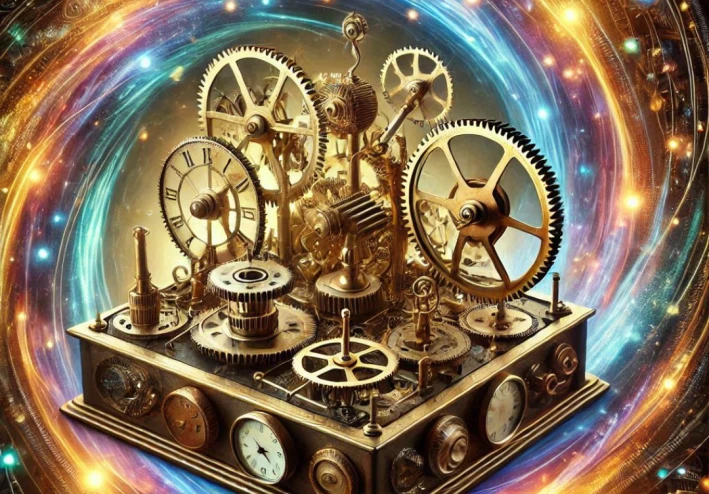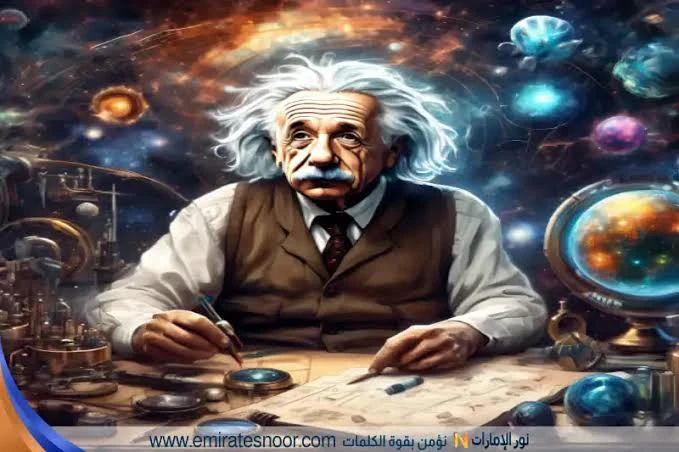
Time Travel: Can Fiction Become Reality?
Scientifically... Time travel is possible

About 350 years ago, in his explanation of the general rules of physics, the English scientist Sir Isaac Newton wrote about time, saying: "I do not need to explain what time is, because it is one of the known absolutes." But the truth is that Newton's conception was far from correct, at least from the point of view of modern physics.
Conceiving of time as a train that always moves in a straight line at a constant speed is contrary to the vision that physicist Albert Einstein explained in his theories of special relativity (1905) and then general relativity (1915) before it was proven by practical experimentation. What relativity simply says is that time is not a train that never goes back, but rather a variable that depends on the interaction of the object observing it with its external environment and the speed and direction of its movement in space.
?Is time travel possible
If time is "relative" and not absolute, does this mean that if we find a way to make time slow down for someone more than for others, that person will move to the "future" faster than we do? Is there anything that would lead us to believe that moving through time is possible? Or will this idea remain confined to science fiction films that have perhaps harmed it more than it has benefited it and made many people underestimate it?
Scientists today, thanks to Einstein's theories, see that time is part of the fabric of the universe, intertwined with space and cannot be separated from it, and that the four dimensions (the three dimensions of space, i.e. length, width and height, in addition to the dimension of time) together form our world that we know. The fourth dimension (time) does not disappear as we imagine once we pass through it, meaning that the moments we have passed through have not become mere "memories" imprinted in our minds and their real existence has not ceased, but on the contrary, they still retain their real physical existence. All that matters is that our mind no longer perceives them because it is not prepared for that.
We can imagine it as a movie strip, as if every minute in this strip contains 24 frames of the film, so we know that we are watching successive frames, but we cannot see more than one frame at the same moment. Does this mean that the rest of the shots do not exist? Of course not. Now imagine that every shot in this movie is equal to what we call "the world, now" and that instead of being mere spectators, we have become the heroes of the movie, living and moving within it in its three spatial dimensions. We will only be able to perceive the shot (moment) that passes us by, and this is exactly what happens to us in reality.
All that matters is that when we are spectators, we have a tool to control the film strip and we have a way to return to the first shot or go to the last shot. But we have not yet found a successful way to return to the past or go to the future in reality. As for the actual, concrete existence of the past, future and present together, it is one of the constants of modern physics today. Therefore, time travel has become logical, at least theoretically.
Einstein: Two ways to travel through time

The amazing thing is that Einstein's theories give us two ways, not one way, to travel through time, which are:
1- Traveling very quickly in space: Many may have heard of the famous example of twins, one of whom rode a rocket traveling at a speed close to the speed of light, and his body disintegrated at a much slower speed than that of his twin who remained on planet Earth. If he had remained in the rocket for fifty years according to our Earthly calculations, he would have remained in the rocket for one year, and all his time-measuring tools would tell him this as well, because this is what actually happened. Some consider this to be time travel for the person on board the rocket, because he remained for one year and then returned to a future point relative to us. But the problem is that this example is only theoretical, because reaching a body with a large mass such as a rocket to the speed of light requires more energy than is available on our entire planet. The reality of this matter is that astronauts who travel on trips that have become common actually return in our future time with a difference of fractions of a second.
2- Gravity: Just like speed, gravity causes time to slow down. But gravity in the classical physics model is a force emanating from objects towards each other. Einstein also reformulated this concept to cancel this image and say that gravity is not a "force" in the literal sense of the word, and that its source is not inherent in mass but is merely a distortion in the cosmic fabric (consisting of four dimensions) that leads to the "fall" of small objects into those distortions caused by larger objects.
Just as gravity can lead to the slowing down of time, escaping from the grip of gravity can lead to the acceleration of time.
How do we currently use our knowledge?
It is strange that we use these natural phenomena daily in our technological applications without knowing, and we keep wondering about their possibility or not while they are already working in our hands. The GPS application that any smartphone contains today depends on determining the location of the phone on the "time" it takes for the signal emitted from the phone to reach the satellite. Since satellites orbit far from the Earth's gravitational field, the effect of gravity on them is much less than it is on the phone, so the clock in the satellite's computer must run faster than the clock in the phone, and these differences must cause an error in measuring the time it takes for the signal to reach from one to the other. This is absolutely true. However, the scientists who created these complex systems were aware of this. The computer on the satellite automatically corrects the time recorded on it every day to keep pace with Earth time, otherwise it would not be able to pinpoint the location accurately.
Other means of time travel
Based on this phenomenon, the famous English cosmologist Stephen Hawking offers another means of time travel, which is to exploit the phenomenon of black holes (an area in outer space that results from a huge stellar explosion and has a super-gravity such that any object or radiation that approaches it falls into it and its size becomes almost zero). Hawking says that sending a spaceship in the future to one of the closest of these holes to us and orbiting around it will cause time to slow down for the astronauts on board relative to the inhabitants of Earth.
However, the distance between us and the closest of these holes and the rate at which time slows down also greatly reduce the effectiveness of the idea in the present and near future at least. However, physicists hold on to a final hope for the possibility of finding a "practical" way for humans to travel through time, which is known as a "wormhole". It is a phenomenon that means "penetrating" the fabric of space and time (Space-Time, or what is commonly called in Arabic space-time)
Is it possible to travel through time?
Yes, time travel is scientifically possible
Hawking said in his article published in the Daily Mail on April 27, 2010: "Until recently, time travel was considered a kind of scientific heresy, so I was reluctant to talk about it for fear of being seen as crazy." Now he is less cautious because he believes that the human race will one day find a way to travel to the future, according to what was reported by "The Week" magazine months ago.
Years ago, Hawking scoffed at the possibility of traveling to the past and said that it would never happen, otherwise we would have travelers from the future among us today. However, many scientists believe otherwise and have already managed to find a solution to the logical contradictions that may result from moving to a time period in the past. What they all agree on is that we may witness in the not-too-distant future an advertisement in a newspaper for an unusual trip organized by some humans to the future.


































